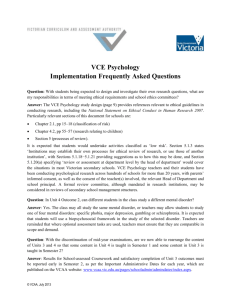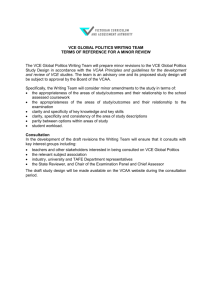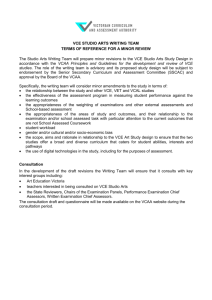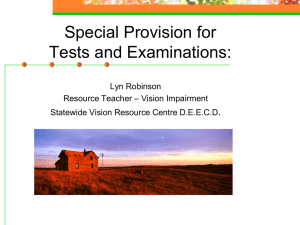exam /study tip # 10
advertisement
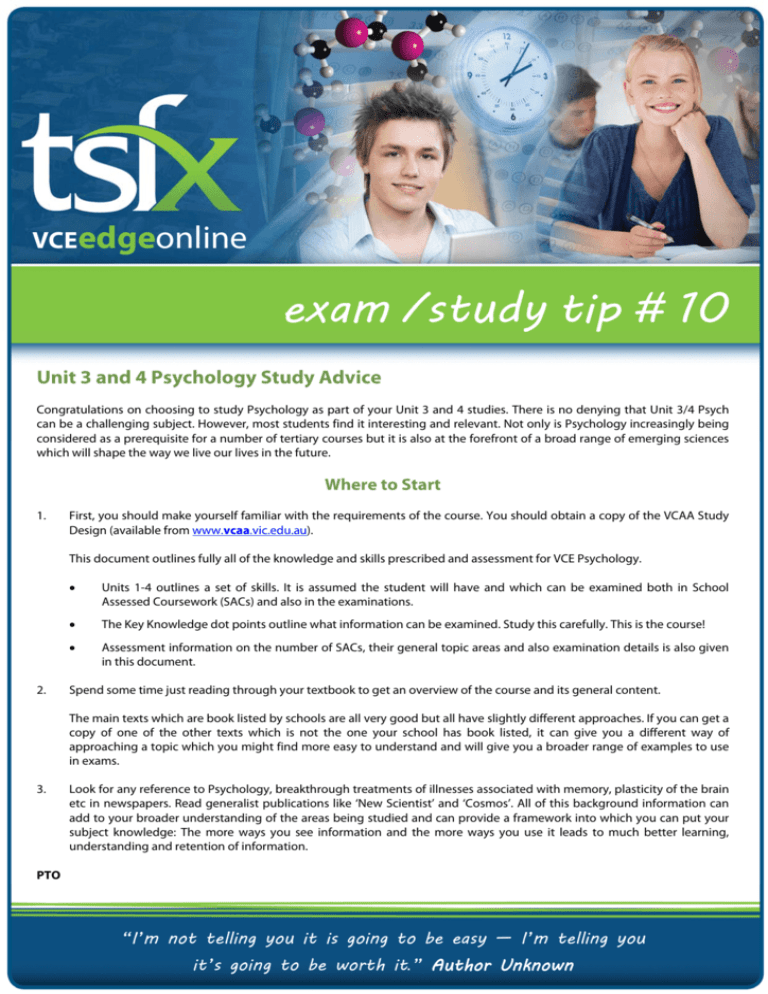
VCEedgeonline exam /study tip # 10 Unit 3 and 4 Psychology Study Advice Congratulations on choosing to study Psychology as part of your Unit 3 and 4 studies. There is no denying that Unit 3/4 Psych can be a challenging subject. However, most students find it interesting and relevant. Not only is Psychology increasingly being considered as a prerequisite for a number of tertiary courses but it is also at the forefront of a broad range of emerging sciences which will shape the way we live our lives in the future. Where to Start 1. First, you should make yourself familiar with the requirements of the course. You should obtain a copy of the VCAA Study Design (available from www.vcaa.vic.edu.au). This document outlines fully all of the knowledge and skills prescribed and assessment for VCE Psychology. 2. Units 1-4 outlines a set of skills. It is assumed the student will have and which can be examined both in School Assessed Coursework (SACs) and also in the examinations. The Key Knowledge dot points outline what information can be examined. Study this carefully. This is the course! Assessment information on the number of SACs, their general topic areas and also examination details is also given in this document. Spend some time just reading through your textbook to get an overview of the course and its general content. The main texts which are book listed by schools are all very good but all have slightly different approaches. If you can get a copy of one of the other texts which is not the one your school has book listed, it can give you a different way of approaching a topic which you might find more easy to understand and will give you a broader range of examples to use in exams. 3. Look for any reference to Psychology, breakthrough treatments of illnesses associated with memory, plasticity of the brain etc in newspapers. Read generalist publications like ‘New Scientist’ and ‘Cosmos’. All of this background information can add to your broader understanding of the areas being studied and can provide a framework into which you can put your subject knowledge: The more ways you see information and the more ways you use it leads to much better learning, understanding and retention of information. PTO “I’m not telling you it is going to be easy — I’m telling you it’s going to be worth it.” Author Unknown VCEedgeonline 4. Aim to build your own course notes. These should be put together from class notes, summaries of the relevant textbook sections, information from other resources and relevant exam questions. You should be looking at going over these notes regularly. As your knowledge and understanding increases these notes can be added to and also edited. By the time the exam comes around you should have a concise set of notes that make sense to you and concentrate on those areas you are still finding difficult and only touch briefly, perhaps even in dot points, on those areas you understand well. Remember, underlining is NOT a good study technique. Read, take notes, re-read and summarise. Your final notes before the exam should be relatively short. I highly recommend that you include examples of VCAA questions straight into your notes, with appropriate answers, as you proceed through the course. It is suggested that at least as much time is spent at home in revision of class notes etc. as is spent in class. 5. Access other resources (these are listed in detail later). As many of the areas in your study will be of processes it is often very helpful to look at video of these occurring (ie. meiosis; translation). There are many great YouTube sites. Other websites have fabulous educational resources and interactive labs that give you a greater understanding of some of the more difficult processes and technologies. 6. Start looking at examination questions early in the course. Resources like ‘Checkpoints’ group exam questions into topic areas and so are perfect for this. It is tempting to think that wrote learning facts will get you good marks. However, Psychology examinations are aimed at seeing how much you understand and how you can apply your knowledge. Examination questions are a wonderful way for you to check your own understanding and also to ‘get inside the mind’ of the examiners. All relevant, past VCAA exams are available on the site and make sure you read the examiners remarks regarding where students ‘went wrong’ in the previous year’s exams. These comments are invaluable. Arguably, there is a very strong correlation between the strength of the final study score for Psychology and the number of past papers that a student is prepared to do. In addition to the VCAA papers that are available on line, might I suggest that you ask your head of department for Science if they are planning on ordering some of the many practice papers that are available for sale through various companies. 7. What if I haven’t done Units 1 or 2 Psychology? Don’t panic. Although Units 1 and 2 provide a deal of background information for the following year, many students who have not completed these units go on to do very well indeed in their Unit 3/4 course. You would be serving yourself very well however, to really through yourself into a crash course in Psychological research methods. These are referred to throughout Units 3 and 4 and will feel quite foreign to students who have not completed Units 1 and 2. PTO voted number one for excellence and quality in vce programs VCEedgeonline The Course - Unit 3: Mind, Brain and Body You should have the following key terms and concepts at the ready for both sacs and the mid-year examination. Consciousness as a psychological construct informed by the work of Rene Descartes and William James. Cartesian Dualism. NWC-normal waking consciousness and altered states of consciousness (daydreaming, meditative and alcohol-induced). In terms of: levels of awareness, content limitations, controlled and automatic processes, perceptual and cognitive distortions, emotional awareness, self-control, time orientation. Consciousness- our awareness of external and internal stimuli and our thoughts and feelings about them. Attention – know the difference between NWC (with more control over divided attention) and ASC – with less control over our abilities to divide attention. Controlled processes and the relationship with selective attention, automatic processes, divided attention and content limitations. It is critical for you to also know the differing experiences that we have with attention, memory, time, self-control, emotions and pain when we are in ASC vs. NWC. Differing theories on why we sleep. 1. Survival theories and 2. Restorative theories. Measuring physiological responses of consciousness-remember that we are measuring a hypothetical construct when measuring an ASC! Best measures of an ASC (like sleep) are: Body temp, heart rate, electrical conductivity. Devices used to record changes are: EEG, EOG, EEG, EMG. VERY important that you discuss each device as: “detects, amplifies and records electrical activity in .........(insert relevant area). NREM sleep consists of 4 stages. Sleep deprivation – physiological effects (headaches, lowered energy, droopy eyelids, reduced reaction time, shaky hands). Sleep deprivation – psychological effects (irrability, high emotionality, feeling of fatigue, loss of concentration, hallucinations after 3 days). The interaction between cognitive processes of the brain and its structure including roles of the : CNS, PNS, four lobes, hemispheric specialisation, RAS (selective attention and wakefulness), role of the thalamus (directing attention, switching sensory input on and off). Broca’s aphasia – can comprehend what is being said or the written word, have difficulty uttering words- conjunctions often missing. Wernicke’s Aphasia – difficulty understanding spoken or written word, words spoken fluently but in a meaningless stream (word salad), difficulty finding the right word to name an object or express an idea. Spatial neglect – caused by an ABI, disrupts the way a person perceives the world. Most commonly ‘left neglect’ caused by trauma to the right parietal lobe. The person is aware that the left half of their world exists but cannot pay attention to it. PTO voted number one for excellence and quality in vce programs VCEedgeonline Split-brain studies – some communication between L and R hemispheres is prevented. However, where sensation has been through the thalamus, it can still be sent to both hemispheres. Perceptual anomalies – motion-after-effect – THE WATERFALL ILLUSION. Perceptual anomalies –SYNAESTHESIA – one sensory perception triggers a perception in another sense. Perceptual anomalies – change blindness – failure to notice a significant change in full view of a visual scene because of: eye movements, eye blink, mudsplash, very slow change. Brain research methods: you need to know an advantage and disadvantage of each method DSB, TMS, CT, MRI, PET, SPECT, FMRI MEMORY: KNOW – the significance of Kandel’s work – the first evidence of the change that occurs during memory formation. Limited – because there is only 6 neurons involved in the gill withdrawal reflex.. Long term potentiation – know the HEBB RULE ‘neurons that wire together, fire together’. Roles of the temporal lobe in memory formation- esp Hippocampus. Role of the Amygdala. Memory decline is not inevitable – high levels of memory ability maintained by maintaining brain activity with a VARIETY of ‘brain-training’ exercises/tasks on a regular basis and avoiding lifestyle that may diminish mental ability (drugs, alcohol, nicotine). Organic causes of memory decline-reduced number of synapses in the hippocampus, reduced insulation on axons of neurons. Frequently caused by...reduced motivation to learn, reduced confidence. Memory decline over lifespan... Decline in working memory Decline in episodic memory Decline in ability to form new memories Decline in prospective memories NO decline in well-learnt semantic memories No decline in procedural memories Causes of memory loss- disease and degeneration KNOW – causes and symptoms of Dementia, and Alzheimer’s Memory- comparison of models for explaining human memory Know differences between: Atkinson-Shiffrin’s multi-store model of memory, Alan Baddley and Graham Hitch’s model of working memory, levels of processing (Craik and lockhart), semantic network theory. Know very well the strengths and limitations of psychological theories of forgetting: retrieval failure theory (including tip of the tongue phenomenon), interference theory, motivated forgetting as informed by the work of Freud including repression and suppression, decay theory. Manipulation and improvement of memory* PTO voted number one for excellence and quality in vce programs VCEedgeonline Forgetting curve as informed by work of Ebbinghaus – (rate of forgetting over time!) Measures of retention including the relative sensitivity of recall, recognition and relearning Use of context dependant cues and state dependant cues Mnemonic devices including acronyms, acrostics, peg-words method, narrative chaining and method of loci Effect of misleading questions on eye-witness testimonies including the reconstructive nature of memory informed by the work of Loftus. Assessment Tasks These, of course, will be designed and assessed by you teacher. Most are written tests, although there is provision in the study design for assessment via essays, posters, and ERA’s. It is VERY important that you read all of the conditions of the SAC before commence writing. Ideally you should be aware of the requirements of the SAC a few days before. Ensure that you have information such as the time limit, and if it is to be a test, roughly how many questions are short answer and multiple-choice. The number of marks per short answer question usually denotes how many ‘bits’ of information is required to get full marks. Remember to NOT give generic definitions as answers in Psychology. At all times, your answers should be linked back to the question. The Mid-Year Examination This exam seems to rush up as Unit 3 is full of content and also there are few opportunities in most schools for a mid-year ‘swot vac’. Make sure you have prepared well by having your revision notes up to date and revised as you progress through the course. Make sure that you work through a number of exams leading up to the mid-year VCAA exam. You may want to attempt a question and then check your answer and then go back to your notes and resources to increase your understanding if needed. You can also go through sections of the exam and time these and then check. As a rough guide 1 mark = 1 minute! Keep one exam to do as a timed 90 minute exam. I suggest last year’s VCAA exam. Sit down in a quite place and do a ‘trial run’ of the upcoming exam. This will be a real help in pacing yourself through the mid-year examination. In the exam, use your reading time carefully. Look carefully at diagrams etc to see if there are any ‘tricks’ such as scales not running from smallest to greatest, etc. Also look at ‘wordage’ and mark value. If you are not a particularly fast reader you may identify some questions which require a lot of reading for very few marks. Perhaps keeps these until the last part of the exam so you minimise the chance of not finishing a question worth more marks. Look at the questions before reading the information. Often there is a lot of information included in a question that is not directly relevant to the question being asked. By looking at the question first you can be more selective in your reading. Towards the end of the exam, try to have enough time to go back over and look for any mistakes or areas where you can add detail. Never leave a multiple choice question unanswered! A 25% chance of a mark is better than none! When answering questions make sure that your spelling of technical words is correct (eg. Parietal not parental!) and that you keep all answers relevant. Look back at the question when you have finished. Make sure you have answered the question asked as well as you can. The Unit 4 exam will require a similar approach but, as you will almost certainly have more swot vac time, you can factor this in when preparing you revision notes. PTO voted number one for excellence and quality in vce programs VCEedgeonline Resources The area of Psychology is continually evolving. New discoveries and knowledge occur almost every day. Here are some resources which you will find useful during your study of Psychology. 1. Your teacher should be a most useful resource. 2. TSFX course notes. 3. Any of the major texts: Heinemann; Jacaranda; etc. 4. ‘Psych notes, Unit 3 and 4’. These 2 books provide useful summary notes for both sections of the course. 5. ‘the psych book’ student manual. By Peter Milesi 6. ‘studyON’ VCE Psychology Unit 3 Jacaranda Martin, Leslie and Kinnear. www.studyon.com.au. An online resource which provides study notes and also exam questions as well as feedback and tracking of your results. 7. Perhaps the most important...past papers. The VCAA website is just the beginning. See your head of department for Science at your school, ask other students at other schools and swap them around. 8. YouTube is quite useful for visualising many experiments. Roger Sperry’s split brain surgery is just one example. voted number one for excellence and quality in vce programs
